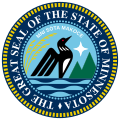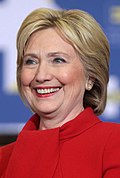2016 Minnesota Democratic presidential caucuses
| |||||||||||||||||||
| |||||||||||||||||||
 Minnesota results by county Bernie Sanders Hillary Clinton Tie | |||||||||||||||||||
| Elections in Minnesota |
|---|
 |
The 2016 Minnesota Democratic presidential caucuses took place on March 1 in the U.S. state of Minnesota as one of the Democratic Party's primaries ahead of the 2016 presidential election.
On the same day, dubbed "Super Tuesday," Democratic primaries were held in ten other states plus American Samoa, while the Republican Party held primaries in eleven states including their own Minnesota caucuses.
Opinion polling
[edit]| Poll source | Date | 1st | 2nd | 3rd | Other |
|---|---|---|---|---|---|
| Caucus results[1] | March 1, 2016 | Bernie Sanders 61.6% | Hillary Clinton 38.4% | ||
| Star Tribune/Mason-Dixon[2] Margin of error: ± 5.7% | January 18–20, 2016 | Hillary Clinton 59% | Bernie Sanders 25% | Martin O'Malley 1% | Undecided 15% |
| Public Policy Polling[3] Margin of error: ± 4.9% | July 30 – August 2, 2015 | Hillary Clinton 50% | Bernie Sanders 32% | Martin O'Malley 4% | Lincoln Chafee 3%, Jim Webb 2%, Not sure 10% |
| Suffolk University[4] Margin of error: ± ? | April 24–28, 2014 | Hillary Clinton 63% | Elizabeth Warren 15% | Joe Biden 4% | Cory Booker 3%, Deval Patrick 2%, Mark Warner 2%, Andrew Cuomo 1%, Undecided 10% |
| Public Policy Polling[5] Margin of error: ± 5.1% | January 18–20, 2013 | Hillary Clinton 59% | Joe Biden 14% | Amy Klobuchar 11% | Elizabeth Warren 4%, Andrew Cuomo 3%, Martin O'Malley 1%, Deval Patrick 0%, Brian Schweitzer 1%, Mark Warner 0%, Someone Else/Undecided 10% |
| Amy Klobuchar 43% | Andrew Cuomo 14% | Elizabeth Warren 10% | Martin O'Malley 1%, Deval Patrick 1%, Brian Schweitzer 0%, Mark Warner 0%, Someone Else/Undecided 30% |
Results
[edit]Primary date: March 1, 2016
National delegates: 69
| Minnesota Democratic caucuses, March 1, 2016 | |||||
|---|---|---|---|---|---|
| Candidate | Popular vote | Estimated delegates | |||
| Count | Percentage | Pledged | Unpledged | Total | |
| Bernie Sanders | 126,229 | 61.69% | 46 | 1 | 47 |
| Hillary Clinton | 78,381 | 38.31% | 31 | 13 | 44 |
| Uncommitted | — | 0 | 2 | 2 | |
| Total | 204,610 | 100% | 77 | 16 | 93 |
| Source: [6] | |||||
Analysis
[edit]Bernie Sanders scored an imperative, much-needed victory in the Minnesota caucus, a state he had targeted to keep his path to the nomination alive. With its populist, mostly white electorate, Minnesota was a state seen as favorable to Sanders based on his performance in previous caucus contests, which was only aided by high voter turnout, almost topping the record of 211,000 votes in the 2008 Minnesota Democratic Presidential Primary. Sanders ran up big margins in Minneapolis and the Minneapolis suburbs, and in the working-class, mostly white Iron Range of northern Minnesota which contains the city of Duluth, where he won north of 60% of the vote. Sanders won 76 out of 87 counties and all eight congressional districts in the state.
Sanders had campaigned hard for the state, appearing with Rep. Keith Ellison, the Congressional Progressive Caucus co-chair who endorsed Sanders in October 2015.[7]
References
[edit]- ^ Caucus results
- ^ "Minnesota Poll Results: Presidential race". Star Tribune. January 23, 2016.
- ^ "Walker, Clinton Lead in Minnesota; General Closer than 2008 and 2012" (PDF). Retrieved August 4, 2015.
- ^ "Suffolk Marginals" (PDF). suffolk.edu. Retrieved July 9, 2015.
- ^ "PPP MN" (PDF). publicpolicypolling.com. Retrieved July 9, 2015.
- ^ The Green Papers
- ^ Reporter, Samantha Lachman Staff; Post, The Huffington (March 1, 2016). "Bernie Sanders Wins Crucial Victory In Minnesota Caucus". The Huffington Post. Retrieved September 25, 2016.


 French
French Deutsch
Deutsch
